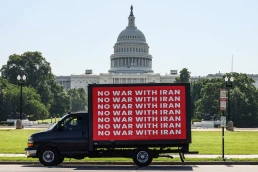Far from lacking a political strategy, Israel is fighting to reinforce the supremacist project it has built for decades between the river and the sea.
By Oren Yiftachel, +972 Magazine
Over the past year, many have argued that the October 7 disaster — the largest massacre of Israeli civilians in the country’s history — was a sign that the status quo of permanent occupation has collapsed. Under Prime Minister Benjamin Netanyahu, Israel had been advancing a policy of long-term “conflict management” to bolster its occupation and settlement of Palestinian lands while containing fragmented Palestinian resistance. This involved financing a “deterred” Hamas, which several Israeli leaders considered to be “an asset.”
It’s true that some aspects of this strategy did collapse in the wake of October 7 — especially the illusion that the Palestinian national project could be crushed, or that Hamas and Hezbollah could be kept at bay in the absence of any political agreements. The notion that Jewish settlement could guarantee security along Israel’s borders and frontiers — a long-standing Zionist myth — was also shattered; beyond the deep trauma and grief suffered by dozens of Jewish border communities, some 130,000 Israelis from more than 60 localities within the Green Line were displaced, and most of them remain so.

Other experts have claimed that Israel’s war in Gaza, and now Lebanon, is void of political strategy for “the day after,” and is fought solely for the sake of Netanyahu’s political survival. But contrary to popular opinion, clear-eyed analysis of the past year shows that Israel continues to promote an unmistakable strategic goal in this war: maintaining and deepening the regime of Jewish supremacy over Palestinians between the Jordan River and the Mediterranean Sea. In this sense, the past 12 months might be best understood as Israel’s “first apartheid war.”
While its eight previous wars attempted to create new geographical and political orders or were limited to specific regions, the current one seeks to reinforce the supremacist political project Israel has built throughout the entire land, and which the October 7 assault fundamentally challenged. Accordingly, there is also a steadfast refusal to explore any path to reconciliation or even a ceasefire with the Palestinians.
Israel’s supremacist order, which was once termed “creeping” and more recently “deepening apartheid,” has long historical roots. It has been concealed in recent decades by the so-called peace process, promises of a “temporary occupation,” and claims that Israel has “no partner” to negotiate with. But the reality of the apartheid project has become increasingly conspicuous in recent years, especially under Netanyahu’s leadership.
Recent Posts
A War With Iran Would Not Be a One-Off Event But a Disastrous Ongoing Rupture
February 26, 2026
Take Action Now If Congress cedes its power to stop a war with Iran, it will fully erode any lingering promise of democratic restraint.By Hanieh…
New Addition to List of Nuclear Near Catastrophes
February 25, 2026
Take Action Now Debris flew for great distances — many times the distance of 270 meters to a nuclear reactor and nuclear storage facility.By David…
Gavin Newsom’s last budget belies his ‘California for All’ pledge
February 24, 2026
Take Action Now Yet, even as the state is poised to lose billions in federal funding, and millions of Californians are losing access to health care…
Israel and American Hawks are Pushing U.S. to Iran War With Catastrophic Consequences
February 23, 2026
Take Action Now At the World Health Assembly in May, member states may endorse an unprecedented strategy declaring that health is not a cost – but…




